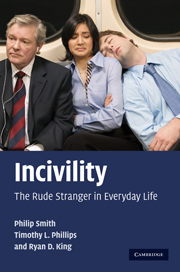Book contents
- Frontmatter
- Contents
- List of figures and tables
- Preface and acknowledgements
- 1 Redirecting incivility research
- 2 The fundamentals of the incivil encounter
- 3 Everyday incivility and the everyday round
- 4 Emotions and sequences
- 5 Gender, age and class: divergent experiences?
- 6 After the event: coping, avoiding and changing
- 7 General attitudes towards the stranger: exploring fear and trust
- 8 How to confront incivility
- 9 Twenty questions and answers
- References
- Index
1 - Redirecting incivility research
Published online by Cambridge University Press: 05 June 2012
- Frontmatter
- Contents
- List of figures and tables
- Preface and acknowledgements
- 1 Redirecting incivility research
- 2 The fundamentals of the incivil encounter
- 3 Everyday incivility and the everyday round
- 4 Emotions and sequences
- 5 Gender, age and class: divergent experiences?
- 6 After the event: coping, avoiding and changing
- 7 General attitudes towards the stranger: exploring fear and trust
- 8 How to confront incivility
- 9 Twenty questions and answers
- References
- Index
Summary
The theme of growing incivility is both a commonplace and a universal of human life. Through the ages and across civilizations there has always been talk of poor public behaviour, of increasingly unruly streets and of the decline and fall of good manners. It is a current journalistic staple to document troublesome youth, identify emergent forms of disorder from ‘road rage’ to ‘cell phone rage’, and to conduct simple experiments or cheap stunts to demonstrate that common courtesies are no longer to be found in the urban jungle (Safe 2000). Books on freefalling manners have long replaced those about etiquette on bestseller lists (Truss 2005). In a related trend, each decade sees an academic leader denounce the triumph of anti-civic individualism whether in the form of the ‘lonely crowd’, ‘narcissism’, the end of ‘public man’ or ‘bowling alone’. What makes our age distinctive is not the presence of such a complaint about the demise of an interpersonally civil society, but rather the intensity and form of the anxiety. A ‘crisis’ of civility has been identified with greater virulence and enthusiasm than ever before. Working in a sometimes uneasy, sometimes convenient, alliance, the media, politicians and academics have come together over the past dozen or so years and located profound dangers which call for desperate remedies. This activity has taken an unhelpful turn. Inspired by a criminological imagination it has come to look telescopically rather than broadly, imagines and investigates incivility in restrictive and extreme ways and stigmatizes the marginalized prematurely.
- Type
- Chapter
- Information
- IncivilityThe Rude Stranger in Everyday Life, pp. 1 - 22Publisher: Cambridge University PressPrint publication year: 2010



